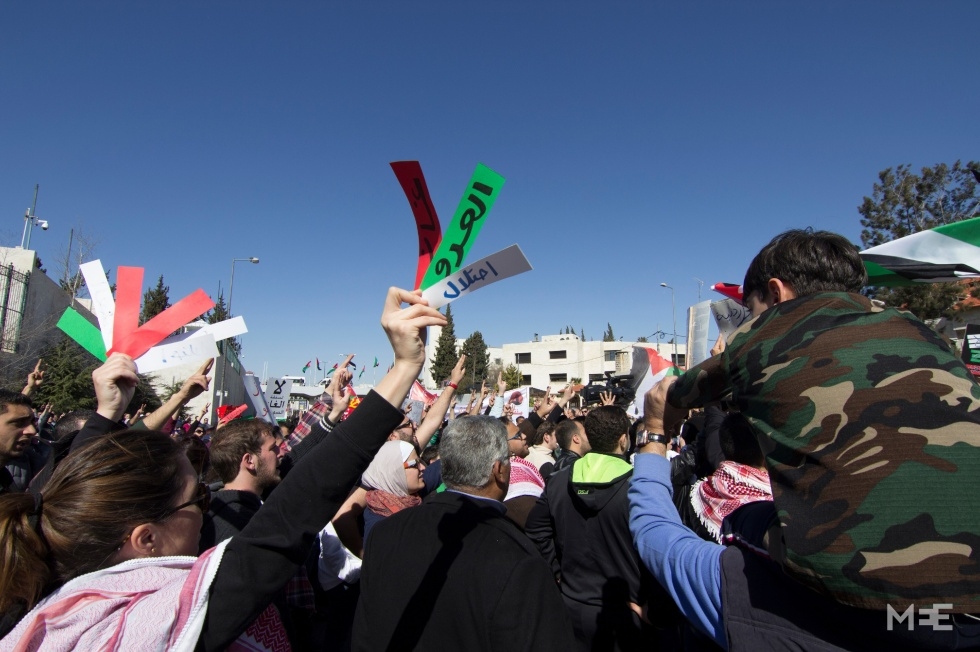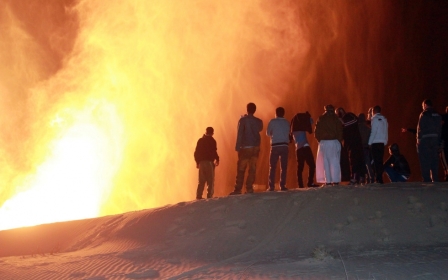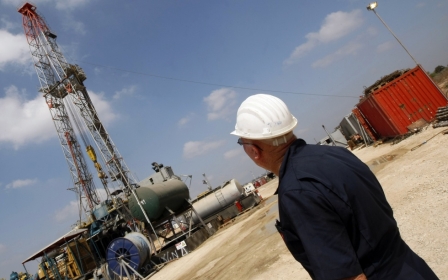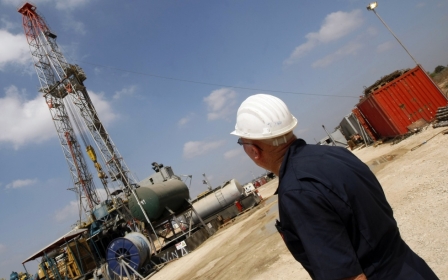Jordan's gas deal that won't go away

AMMAN - In recent weeks, Jordan’s civil society organisations – which rarely coalesce around any one issue – have joined together to fight a gas deal that won’t seem to go away.
In September, Jordan’s state-owned National Electric Power Company (NEPCO) signed a letter of intent that would have US-based Noble Energy supply as much as $15bn worth of Israeli gas from its offshore Leviathan field to Jordan for the next 15 years.
It followed an earlier $771m deal, inked in February 2014, between Jordan’s Arab Potash Company and Noble, as well as Israel’s Delek Group, to supply gas from Israel’s offshore Tamar field. The second agreement sparked a national outcry. Some 8,000 Jordanians signed a petition against the deal and protests were held.
The majority of Jordan’s parliamentarians – 107 out of 120 - voted on 10 December against the deal, although their vote was non-binding, allowing the government to move forward with it regardless.
By January, Jordanian officials were telling reporters that the deal was off. Yet, the deal seems very much to be a going concern: a source close to the Jordanian deal told Middle East Eye in late February that the Jordanian official who spoke out against the deal wasn’t a key decision maker on the project and he expected Israeli gas to be exported to Jordan by the end of the year.
The apparent continuation of the deal helped to draw thousands of people onto the streets of Amman last Friday, demanding a final end to the deal. More than 2,500 protesters from unions, political parties and civil society organisations chanted against the gas deal and also condemned the signed ‘Red Sea – Dead Sea’ project.
"The gas of the enemy is occupation," they chanted. “Our people will not fund wars on Gaza!”
What first began as a small grassroots movement with more than two dozen groups protesting the gas deal – including military pensioners and Jordan’s boycott, divestment and sanctions (BDS) group - has now become one umbrella group, The Jordanian National Campaign to Stop the Zionist Gas Deal.
It’s also sprouted transnational cooperation, particularly between local BDS movements including the Palestinian branch which has been protesting against a $1.2bn deal that would see Israel supply gas to a Palestinian power company for 20 years.
In November, a small group of protesters who are part of London’s BDS movement stood outside the Jordanian Embassy in Knightsbridge to demand an end to the deal. Last month, BDS South Africa also held a protest picket line in front of the Jordanian Embassy in Pretoria.
Hisham al-Bustani, a dentist by day and the campaign coordinator for the national campaign, said at Friday’s protest that the gas deal has regenerated grassroots interests in pushing against normalisation with Israel.
“In the past five years, unfortunately, the anti-normalisation for important causes was neglected because of the Arab Spring and the different political views,” Bustani told MEE. Twenty years after the Israel-Jordan peace treaty, he said, trade between the two countries, estimated to range between $35-$40m annually, is insignificant and has failed to reach Jordanians.
However, the gas deal could provide a significant boost to Jordan’s economy, saving the country $1bn annually, according to the Jordanian Minister of Energy and Mineral Resources.
More difficult for Jordanian campaigners to swallow though would be the estimated $8.4bn of profit that the deal could bring to Israeli coffers, with another $4.9bn in private sector gains, according to a study by Mika Minio-Paluello an energy analyst at think tank Platform.
“The last war on Gaza cost the Israeli military $2.7bn,” said Bustani. “This amount in profits will fund three more wars on Gaza straight out of the pockets of Jordanians.”
“The gas deal will force the Jordanians to normalise relations,” he added. “It will reach every house, first you will be funding the Zionist entity and secondly our sovereignty will be under the mercy of Israel," he added.
Dina Hashim, an NGO employee who attended Friday’s protest with her two children said: "I have been living in Jordan now for ten years and I feel very passionate that Jordan remains sovereign and that it continues to remain independent without dependence on Israel which has caused intolerable amount of pain and suffering on the Gazan people and the Palestinian people.”
For many protesters in Jordan, in which half of the population is estimated to be made up of Palestinian refugees, the memory of last summer’s Gaza war is so fresh, that the idea of doing business with Israel is unthinkable.
“It has been only a few months since the Zionist occupation massacred our families in Gaza but the Jordanian government struck the Red Sea-Dead Sea project and they are discussing the gas deal,” said Muhammad Salameh of Jordan’s Communist Party.
“We refuse them and we stand with the Palestinian people,” he added.
Nawal Hashesho, head of Women for Jerusalem Association, said that while Israel is Jordan’s “most vicious” enemy, the country continues to “deal with Israel politically as if it is a peaceful state.”
“But it is a state of aggression, racism and occupation,” Hasesho said. “The gas is Palestinian in the hands of the Israelis and upon that we are going to pay them for it.”
New MEE newsletter: Jerusalem Dispatch
Sign up to get the latest insights and analysis on Israel-Palestine, alongside Turkey Unpacked and other MEE newsletters
Middle East Eye delivers independent and unrivalled coverage and analysis of the Middle East, North Africa and beyond. To learn more about republishing this content and the associated fees, please fill out this form. More about MEE can be found here.




